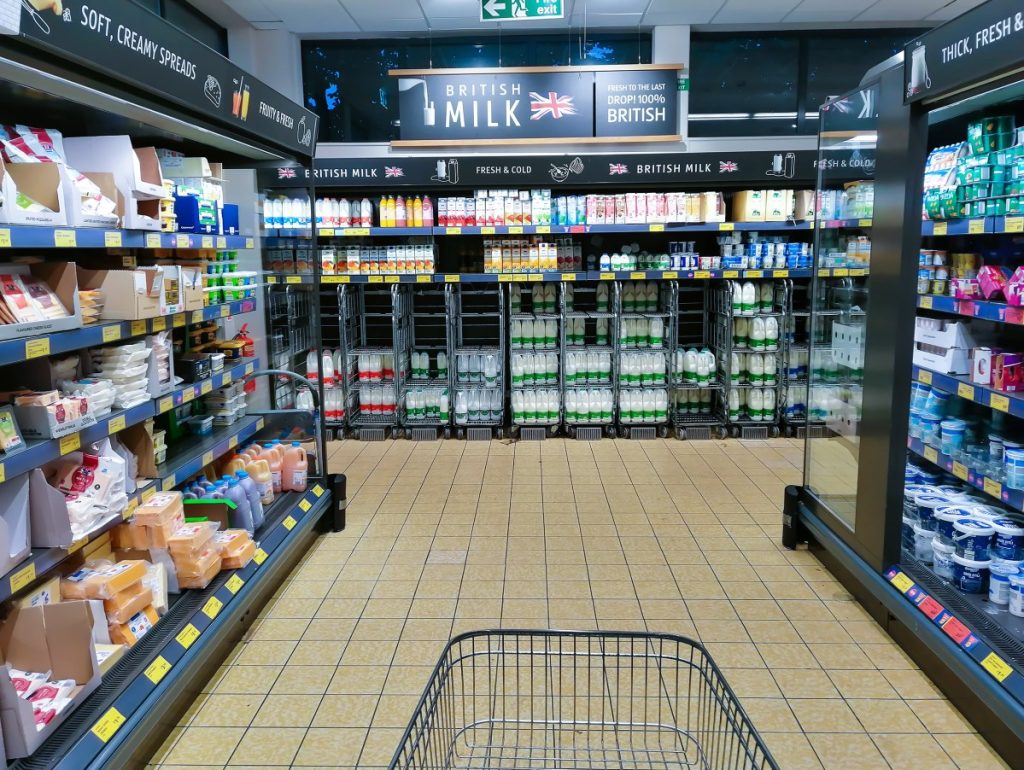Food retailers are being allowed to get away with greenwash – Inside track
4 min read
This post is by Jessica Sinclair Taylor, head of policy at Feedback.
Over 20 years since BP’s infamous rebrand to ‘Beyond Petroleum’ set the standard for corporates who say one thing and do (or don’t do) another on climate, businesses are under increasing scrutiny when it comes to greenwash. A ‘green taxonomy’ for the finance sector is in development, and both the Competition and Markets Authority (CMA) and the Advertising Standards Authority (ASA) have recently issued updated guidance on making green claims.
This greater clarity is much needed, because in the absence of sufficiently robust regulatory framework to put the UK on track for Net Zero, companies seem to have been granted carte blanche with the green paintbrush.
Feedback scores food retailers on greenwash
Feedback has investigated this phenomenon in the food retail market in our latest update to our bi-annual ‘Meat and Climate Scorecard’. This assesses supermarkets on their action on animal products as a driver of the climate emergency. This year’s scorecard used twelve indicators, based on an academic definition of ‘greenwash’, to signal how seriously retailers are taking their climate responsibilities.
We found a sorry picture. Retailers focus their sustainability PR, both to investors and customers, on relatively minor initiatives, such as promoting a switch to LED lightbulbs or tweaks to plastic packaging, while ignoring the enormous climate burden of their meat and dairy sales. These products represent around a third of their overall emissions – a major barrier to reducing their carbon footprint. Alongside low levels of transparency on their biggest sources of emissions, none have substantiated their climate goals with actual roadmaps for action which can be independently verified. And all supermarkets – even those which explicitly acknowledge the role of cutting meat and dairy consumption to reach climate goals – continue to promote these products with multibuys, offers and even recipe selections overwhelming biased towards them.
One prominent case study illustrates the problem. Tesco’s very visible fleet of electric delivery vans, when at full operation in 2030, will deliver 82,000 tonnes of emissions savings. This is a mere 0.1 per cent of their current yearly footprint. Like many supermarkets, Tesco used COP26 in Glasgow to make climate pledges, including setting a net zero target. But this target has yet to be backed up with a plan for how they plan to get there, which was promised for last year. The problem may lie in the reality of their emissions breakdown: we calculate that Tesco’s meat, fish and dairy products represent at least 24.8 million tonnes of CO2e, or around a third of their overall emissions. A credible net zero strategy must engage with this reality and start to reduce meat and dairy sales.
Business as usual is easy without leadership
In many ways, this course of action is no surprise: in the absence of clear guidance and leadership from government, retailers are left to chart their own course and are inevitably prey to the siren song of business as usual. As the Climate Change Committee’s (CCC’s) latest progress report to parliament points out, the government has virtually no plan to reduce agricultural and land use emissions. Alongside this is a worrying reliance on unproven future technologies to solve the problem (a familiar story from the retailers as well, most notably Morrisons’ much vaunted plans for ‘net zero beef’). The government has completely disregarded the potential of tackling consumer demand, in particular changes to diet.
Feedback is now challenging this in court. A judicial review of the government’s Food Strategy will be heard in November, on the grounds that it fails to take account of the CCC’s guidance that reducing meat and dairy consumption is essential to bring down the greenhouse gas emissions from land use and agriculture.
So much could be done. Local and national governments in Europe are trialling measures, from advertising restrictions and support for a ‘meat tax’. With the pressure to appear credible on climate ever growing, even retailers might welcome some clarity on what they should be doing. Meanwhile, German businesses are pressing ahead, with the supermarket chain Penny recently trialling the ‘true cost’ pricing of some foods, including sausage and cheese, though the results have yet to be shared. Feedback will be sharing policy recommendations for diet’s role in a just transition to a low carbon society later this year.
It is increasingly apparent that, in the absence of a major jolt to the system, voluntary action by supermarkets won’t save us anytime soon. Regulatory options have been scrapped or kicked so far down the road they’ve disappeared over the horizon. Instead, it is increasingly left to consumers and their under-funded regulatory representatives, like the CMA and the ASA, to call out greenwash. Feedback has raised concerns to the CMA regarding this in the food retail sector and we are awaiting the outcome.





